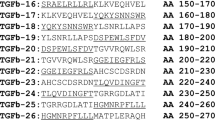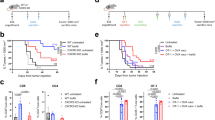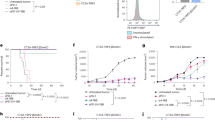Abstract
Cytotoxic T lymphocyte (CTL) mediated tumor immunity against major histocompatibility antigen (MHC) class I-positive but class II-negative tumors often requires help from CD4+ T cells. These CD4 cells are activated by MHC class II-positive cells that present tumor derived antigens1,2. Considering that different antigen presenting cells, such as B cells, macrophages and dendritic cells compete for antigen and influence the outcome of an immune response3–13, we analyzed tumor immunity in B cell-deficient mice14. These mice appear normal with regard to T cell immunity and tolerance to some pure foreign antigens15–19. We show here that the low immunogenicity of tumors is caused by B cells whose presence in the priming phase results in disabled CD4+ T cell help for CTL mediated tumor immunity. Instead, in the presence of B cells, a non-protective humoral immune response is induced. Our results may explain the enigmatic observation that tumor-reactive antibodies occur frequently in cancer patients20.
This is a preview of subscription content, access via your institution
Access options
Subscribe to this journal
Receive 12 print issues and online access
$209.00 per year
only $17.42 per issue
Buy this article
- Purchase on Springer Link
- Instant access to full article PDF
Prices may be subject to local taxes which are calculated during checkout
Similar content being viewed by others
References
Ellenhorn, J.D.I., Schreiber, H. & Bluestone, J.A. Mechanism of tumor rejection in anti-CD3 monoclonal antibody-treated mice. J. Immunol. 144, 2840–2846 (1990).
Cavallo, F. et al. Role of neutrophils and CD4+ T lymphocytes in the primary and memory response to nonimmunogenic murine mammary adenocarcinoma made immunogenic by IL-2 gene. J. Immunol. 149, 3627–3635 (1992).
Lanzavecchia, A. Antigen-specific interaction between T and B cells. Nature 314, 537–539 (1985).
Ron, Y. & Sprent, J. T cell priming in vivo: A major role for B cells in presenting antigen to T cells in lymph nodes. J. Immunol. 138, 2848–2856 (1987).
Janeway, Jr., C.A., Ron, J. & Katz, M.E. The B cell is the initiating antigen-presenting cell in peripheral lymph nodes. J. Immunol. 138, 1051–1055 (1987).
Ashwell, J.D. Are B lymphocytes the principal antigen-presenting cells in vivo? J. Immunol. 140, 3697–3700 (1988).
Fuchs, E.J. & Matzinger, P. B cells turn off virgin but not memory T cells. Science 258, 1156–1159 (1992).
Eynon, E.E. & Parker, D.C. Small B cell as antigen-presenting cells in the induction of tolerance to soluble protein antigens. J. Exp. Med. 175, 131–138 (1992).
Constant, S. et al. Peptide and protein antigens require distinct antigen-presenting cell subsets for the priming of CD4+ T cells. J. Immunol. 154, 4915–1923 (1995).
Simitsek, P.D., Campbell, D.G., Lanzavecchia, A., Fairweather, N. & Watts, C. Modulation of antigen processing by bound antibodies can boost or suppress class II major histocompatibility complex presentation of different T cell determinants. Exp. Med. 181, 1957–1963 (1995).
Saoudi, A., Simmonds, S., Huitinga, I. & Mason, D. Prevention of experimental allergic encephalomyelitis in rats by targeting autoantigen to B cells: evidence that the protective mechanism depends on changes in the cytokine response and migratory properties of the autoantigen-specific T cells. J. Exp. Med. 182, 335–344 (1995).
Stockinger, B., Zal, T., Zal, A. & Gray, D. B cells solicit their own help from T cells. J. Exp. Med. 183, 891–899 (1996).
Macaulay, A.E., DeKruyff, R.H. & Umetsu, D.T. Antigen-primed T cells from B cell-deficient JHD mice fail to provide B cell help. J. Immunol. 160, 1694–1700 (1998).
Kitamura, D., Roes, J., Kuhn, R. & Rajewsky, K. A B cell-deficient mouse by targeted disruption of the membrane exon of the immunoglobulin mu chain gene. Nature 350, 423–426 (1991).
Epstein, M.M., Rosa, F.D., Jankovic, D., Sher, A. & Matzinger, P. Successful T cell priming in B cell-deficient mice. J. Exp. Med. 182, 915–922 (1995).
Vella, A.T., Scherer, M.T., Shultz, L., Kappler, J.W. & Marrack, P. B cells are not essential for peripheral T-cell tolerance. Proc. Natl. Acad. Sci. USA 93, 951–955 (1996).
Phillips, J.A. et al. CD4+ T cell activation and tolerance induction in B cell knockout mice. J. Exp. Med. 183, 1339–1344 (1996).
Asano, M.S. & Ahmed, R. CD8 T cell memory in B cell-deficient mice. J. Exp. Med. 183, 2165–2174 (1996).
Di Rosa, F. & Matzinger, P. Long-lasting CD8 T cell memory in the absence of CD4 T cells or B cells. J. Exp. Med. 183, 2153–2163 (1996).
Disis, M.L. & Cheever, M.A. Oncogenic proteins as tumor antigens. Curr. Opin. Immunol. 8, 637–642 (1996).
Schreiber, H. Tumor Immunology. In: Fundamental Immunol. 3rd edn. (ed. W. E. Paul) pp 1143–1178, Raven, New York, (1993).
Blankenstein, T., Cayeux, S. & Qin, Z. Genetic approaches to cancer immunotherapy. Rev. Phys. Biochem. Pharmacol. 129, 1–49 (1996).
Huang, A.Y. et al. Role of bone marrow-derived cells in presenting MHC class I-restricted tumor antigens. Science 264, 961–965 (1994).
Cayeux, S. et al. Influence of gene-modified (IL-7, IL-4, and B7) tumor cell vaccines on tumor antigen presentation. J. Immunol. 158, 2834–2842 (1997).
Lubin, R. et al. Serum p53 antibodies as early markers of lung cancer. Nat. Med. 1, 701–702 (1995).
Houbiers, J.G.A. et al. Antibodies against p53 are associated with poor prognosis of colorectal cancer. Brit. J. Cancer 72, 637–641 (1995).
Feldman, J.D. Immunological enhancement: a study of blocking antibodies. Adv. Immunol. 15, 167–214 (1972).
Rowley, D.A. & Stach, R.M. A first or dominant immunization. I. Suppression of simultaneous cytolytic T cell responses to unrelated alloantigens. J. Exp. Med. 178, 835–840 (1993).
Gajewski, T.F., Pinnas, M., Wong, T. & Fitch, F.W. Murine Th1 and Th2 clones proliferate optimally in response to distinct antigen-presenting cell populations. J. Immunol. 146, 1750–1758 (1991).
Awwad, M. & North, R.J. Immunologically mediated regression of a murine lymphoma after treatment with anti-L3T4 antibody. A consequence of removing L3T4+ suppressor T cells from a host generating predominantly Lyt-2+ T cell-mediated immunity. J. Exp. Med. 168, 2193–2206 (1988).
Monach, P.A., Schreiber, H. & Rowley, D.A. CD4+ and B lymphocytes in transplantation immunity.II. Augmented rejection of tumor allografts by mice lacking B cells. Transplantation 55, 1356–1361 (1993).
Steinman, R.M. The dendritic cell system and its role in immunogenicity. Annu. Rev. Immunol. 9, 271–296 (1991).
Schultz, K.R., Klarnet, J.P., Gieni, R.S., Hayglass, K.T. & Greenberg, P.D. The role of B cells for in vivo T cell responses to a Friend virus-induced leukemia. Science 249, 921–923 (1990).
Prehn, R.T. Perspectives on oncogenesis: does immunity stimulate or inhibit neoplasia? J. Reticulo. Soc. 10, 1–16 (1971).
Sahin, U. et al. Human neoplasms elicit multiple specific immune responses in the autologous host. Proc. Natl. Acad. Sci. USA 92, 11810–11813 (1995).
Author information
Authors and Affiliations
Rights and permissions
About this article
Cite this article
Qin, Z., Richter, G., Schüler, T. et al. B cells inhibit induction of T cell-dependent tumor immunity. Nat Med 4, 627–630 (1998). https://doi.org/10.1038/nm0598-627
Received:
Accepted:
Issue Date:
DOI: https://doi.org/10.1038/nm0598-627
This article is cited by
-
B cells in head and neck squamous cell carcinoma: current opinion and novel therapy
Cancer Cell International (2024)
-
Role of fibrosarcoma-induced CD11b+ myeloid cells and tumor necrosis factor-α in B cell responses
Oncogene (2022)
-
B cells and tertiary lymphoid structures as determinants of tumour immune contexture and clinical outcome
Nature Reviews Clinical Oncology (2022)
-
Tumor-infiltrating B cells as a favorable prognostic biomarker in breast cancer: a systematic review and meta-analysis
Cancer Cell International (2021)
-
HER2-antigen-specific humoral immune response in breast cancer lymphocytes transplanted in hu-PBL hIL-4 NOG mice
Scientific Reports (2021)



